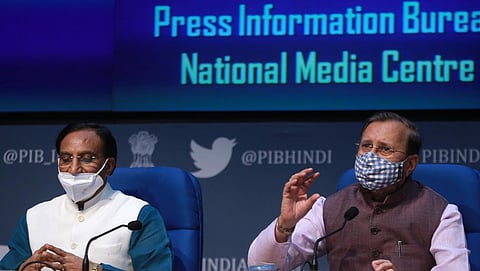

NEW DELHI: The Union Cabinet on Wednesday approved the New Education Policy — a vision document to guide India's education blueprint for coming years - giving closure to an exercise that had begun in the first tenure of the Narendra Modi government.
The approval of the nearlyly 400-page document paves the way for the restructuring of school education from the current 10+2 model to 5+3+3+4 covering ages 3-18 and renaming the Union Ministry of Human Resources Development to Education Ministry.
The NEP will also facilitate the establishment of a central regulatory body for all school boards, called the National Assessment Centre to ensure uniform education levels across the country.
The government has also planned to introduce vocational training for school children beginning class 6 including internships and reducing textbooks to core concepts with greater emphasis on experiential learning.
In higher education, the NEP will allow multiple entry and exit options in the bachelor’s programme, multi-disciplinary courses, the option of 3 or 4 years for UG courses, and discontinuation of M Phil programme.
“The changes we are proposing in the education sector through the NEP will bring not only incremental but transformational changes in the field,” said Union HRD minister Ramesh Pokhariyal Nishank.
School children, through the policy, will be given increased flexibility and choice of subjects to study, particularly in secondary school - including subjects in physical education, the arts and crafts, and vocational skills.
Also, there will be no hard separation among ‘curricular’, ‘extracurricular’, or ‘co-curricular’, among ‘arts’, ‘humanities’, and ‘sciences’, or between ‘vocational’ or ‘academic’ streams.
Wherever possible, the medium of instruction until at least Grade 5, but preferably till Grade 8 and beyond, will be the mother tongue or local language, says the new policy which replaces the earlier policy adopted in 1986 and modified in 1992.
The NEP also says that textbooks will include knowledge from ancient India to modern India as well as future aspirations and Indian Knowledge Systems, including tribal knowledge and indigenous and traditional ways of learning, will be covered.
Also, all students will take school examinations in grades 3, 5, and 8 also, which will test the achievement of basic learning outcomes and application of knowledge in real-life situations. Board exams for grades 10 and 12, on the other hand, will be made “easier”, as they will test primarily core capacities or competencies rather than months of coaching or memorization.
In the higher education sector, UGC, AICTE and the National Council for Teacher’s Education will be merged into a single higher education commission.
The NEP that finally got the Cabinet approval has been built on two draft versions prepared by committees under TSR Subramanian and K Kasturirangan.
New Education Policy 2020 in a nutshell